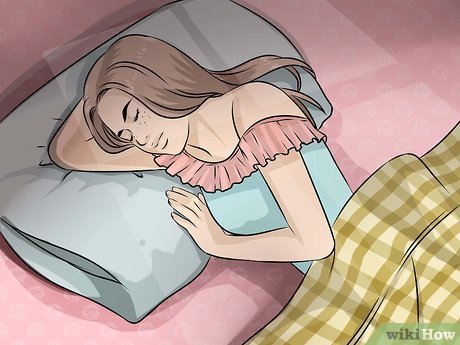Menopause and sleep are related. Did you know that? Many women experience changes in their sleep patterns during menopause. In this blog post, we will discuss the relationship between menopause and sleep, its causes, and many tips on how to get a good night’s sleep during this time.
Contents
What Is Menopause?
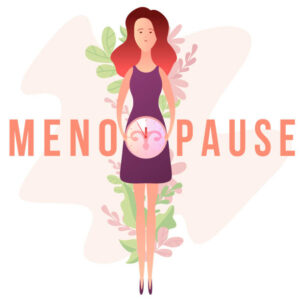
Menopause is the cessation of menstrual periods for 12 consecutive months. This transition usually begins in a woman’s late 40s to early 50s, but menopause can occur as early as age 35 or as late as age 60. It marks the end of a woman’s childbearing years and her reproductive system gradually shuts down.
Symptoms
The most common symptom of menopause is hot flashes, which are sudden feelings of warmth that spread over the body. They are often accompanied by a rapid heart rate and sweating. Hot flashes can occur at any time, day or night, and they can last from a few seconds to several minutes. Other menopausal symptoms include:
- Mood swings
- Irritability
- Depression
- Anxiety
- Sleep problems (insomnia)
- Fatigue
How Does Menopause Affect Sleep?
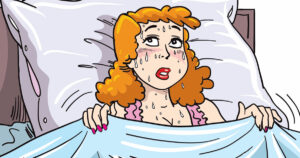 Menopause is a time of major hormonal, physical, and psychological change for women. All that change wreaks havoc on their sleep. The changes in hormone levels occurring during menopause cause hot flashes and night sweats, which can disrupt sleep.
Menopause is a time of major hormonal, physical, and psychological change for women. All that change wreaks havoc on their sleep. The changes in hormone levels occurring during menopause cause hot flashes and night sweats, which can disrupt sleep.
Hormonal Reasons
Menopause occurs because a woman’s ovaries stop producing estrogen-progesterone. Both of these hormones are involved in bodily processes that affect mood, appetite, sleep, etc.
- Estrogen plays a role in the metabolism of serotonin and other neurotransmitters that affect our sleep and wake cycle. It also helps maintain a low body temperature during the night which promotes better sleep. Estrogen also has an antidepressant effect. Women with less estrogen may have a high body temperature, poor sleep quality, and poor mood.
- Progesterone affects breathing due to which low levels contribute to sleep apnea and related sleep problems. Thus, menopause can lead to changes in a woman’s sleep patterns. For example, some women find difficulty falling asleep during menopause. Others may experience more fragmented sleep or wake up frequently throughout the night.
Other Reasons
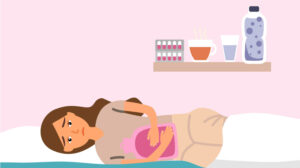 Our sleep and wake cycle also changes with age, losing consistency. Earlier, we start to feel tired and wake up early in the morning, which leads to less sleep in general. That’s why older people, including postmenopausal women, are at increased risk of Insomnia.
Our sleep and wake cycle also changes with age, losing consistency. Earlier, we start to feel tired and wake up early in the morning, which leads to less sleep in general. That’s why older people, including postmenopausal women, are at increased risk of Insomnia.
- While mood swings that occur during menopause may be related to hormonal changes, they may also be due to other life stresses that occur during menopause.
- Caring for older parents, and caring for one’s own age also increase a woman’s stress which degrades sleep quality during menopause.
- Women may also start taking medications, due to menopause or other aging symptoms, which interfere with their sleep.
- Arthritis, body aches, and bladder problems associated with age can also contribute to sleep disorders.
Sleep Issues Associated With Menopause
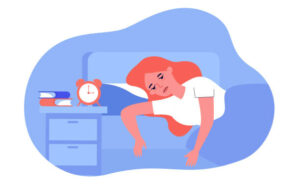 Menopausal symptoms can vary from woman to woman out of which Sleep issues are the most common. There are a few different types of sleep issues that are linked with menopause such as Insomnia, Sleep-Disordered Breathing, and Other Mood and Sleep Disorders. These sleep disorders are discussed in discussed below:
Menopausal symptoms can vary from woman to woman out of which Sleep issues are the most common. There are a few different types of sleep issues that are linked with menopause such as Insomnia, Sleep-Disordered Breathing, and Other Mood and Sleep Disorders. These sleep disorders are discussed in discussed below:
Insomnia
Insomnia is the inability to fall asleep or stay asleep. It can be caused by menopausal symptoms such as hot flashes and night sweats. Insomnia can also be caused by stress, anxiety, depression, medications, and other medical conditions. People with insomnia experience restless sleep, lose general sleep, wake up early, are often sleepy during the day, and feel tired.
In women, every fourth of 7 women have some symptoms of insomnia. The risk of insomnia increases during menopause, with 61% of postmenopausal women reporting symptoms of insomnia.
Sleep-Disordered Breathing
Sleep-disordered breathing is a group of disorders that affect how you breathe while you sleep. These disorders include snoring, sleep apnea, and upper airway resistance syndrome. Sleep-disordered breathing can cause insomnia, daytime fatigue, and other menopausal symptoms.
Snoring and sleep apnea are more common in postmenopausal women. Obstructive sleep apnea (OSA) is a sleep disorder characterized by temporary interruption of breathing that causes shortness of breath, snoring, and choking sounds, as well as lack of sleep.
Other Mood And Sleep Disorders
Menopause can also worsen mood disorders such as anxiety and depression. These disorders can make it difficult to fall asleep. Menopause can also cause or worsen other sleep disorders such as restless legs syndrome. RLS is associated with involuntary movements of the legs, which cause unpleasant sensations and thus disrupt sleep. Menopausal sleep disorders are often accompanied by depression and anxiety, which can worsen sleep problems. Likewise, lack of sleep can cause or contribute to anxiety and depression
Treatment Options
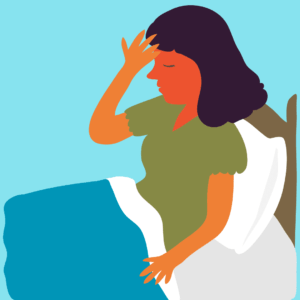 There are no one-size-fits to the sleep issue with menopause as it affects each woman differently. Menopause causes a variety of changes in a woman’s body, including hot flashes, night sweats, mood swings, and more. These changes can also affect a woman’s sleep, leading to insomnia and other sleep problems. Menopause can be a difficult time for many women, but there are treatments available that can help relieve menopausal symptoms and improve sleep quality.
There are no one-size-fits to the sleep issue with menopause as it affects each woman differently. Menopause causes a variety of changes in a woman’s body, including hot flashes, night sweats, mood swings, and more. These changes can also affect a woman’s sleep, leading to insomnia and other sleep problems. Menopause can be a difficult time for many women, but there are treatments available that can help relieve menopausal symptoms and improve sleep quality.
Hormonal Therapies
There are some general treatments that help relieve menopausal symptoms and improve sleep. Two common treatments for menopause include Estrogen Replacement Therapy (ERT) and Hormone Replacement Therapy (HRT). Both of these treatments have been effective in relieving menopausal symptoms, including hot flashes and insomnia.
- Estrogen Replacement Therapy (ERT): This is a type of HRT that increases estrogen and progesterone.
- Hormone Replacement Therapy (HRT): This is the most common treatment for menopause and can be very effective in relieving symptoms. It increases estrogen.
Non-Hormonal Therapies
These include therapies that do not use hormones to relieve menopausal symptoms.
The most commonly used therapy is Cognitive Behavioral Therapy. This therapy relieves insomnia, including menopausal symptoms. At CBT, you work with a qualified therapist. He identifies thoughts and behaviors that negatively affect your sleep and learns to replace them with healthier behaviors that promote good sleep. This type of therapy can help menopausal women identify and change any negative thoughts that may be contributing to their sleep problems.
There are many other non-hormonal therapies available to help with sleep problems associated with menopause. Some of these include:
- Hormone Therapy: It is used to help menopausal women who are experiencing hot flashes and night sweats.
- Relaxation Techniques: It involves things like yoga, deep breathing, and progressive muscle relaxation.
- Herbal Supplements: Some menopausal women find relief from sleep problems by taking herbal supplements such as black cohosh or chamomile.
Medications
 Taking medications also gives relief and may solve your sleep issue due to menopause. Some need proper advice from the doctor while some may not. Examples include certain medications such as antidepressants, low-dose birth control pills, and Gabapentin.
Taking medications also gives relief and may solve your sleep issue due to menopause. Some need proper advice from the doctor while some may not. Examples include certain medications such as antidepressants, low-dose birth control pills, and Gabapentin.
- Melatonin is another example. Low doses of melatonin improve bedtime mood in postmenopausal women. Like estrogen and progesterone, melatonin also decreases with age 20.
- Low doses of antidepressants and SSRIs, including fluoxetine, paroxetine, and venlafaxine, relieve menopausal symptoms, including hot flashes. Some, such as Bazedoxifene alleviates hot flashes by improving sleep quality.
Lifestyle Changes
 Menopause can be a time of big changes, both physically and emotionally. One common menopause symptom is trouble sleeping. If you’re menopausal and having trouble sleeping, know that you’re not alone. Many women experience sleep problems during menopause. But there are things you can do to ease menopausal sleep issues. Menopausal women can follow the mentioned tips to sleep better:
Menopause can be a time of big changes, both physically and emotionally. One common menopause symptom is trouble sleeping. If you’re menopausal and having trouble sleeping, know that you’re not alone. Many women experience sleep problems during menopause. But there are things you can do to ease menopausal sleep issues. Menopausal women can follow the mentioned tips to sleep better:
Establish A Regular Sleep Schedule
Inculcate a fixed sleep time and stick to it as much as possible. Going to bed and waking up at the same time each day can help regulate your body’s natural sleep rhythm. Develop a bedtime routine that will keep you cool and reduce stress.
Peaceful Bedtime
Create a relaxing bedtime routine. Winding down for 30 minutes before sleep with activities like reading, listening to calm music, or taking a bath helps you bring from the hustle and bustle of the day to a more relaxed state that’s conducive to sleep.
Keep Your Bedroom Cool, Dark, And Quiet
Creating an environment that’s conducive to sleep helps your body relax and makes it easier to fall asleep. Develop a sleep regime if you wake up sweaty at night. Try to stay in bed with the light off. Avoid doing anything that wakes you up, such as watching TV. Change your nightgown or drink a glass of cold water.
Light Clothes
Wear light pajamas to cool off at night. Moisture-wicking sportswear is another good option. Also, replace the bedding with cooler fabrics made of natural fibers such as cotton.
Say No To Caffeine
Avoid caffeine and alcohol before bed. Caffeine can interfere with sleep, so avoid drinking coffee, tea, or soda in the evening. Alcohol may make you feel sleepy at first, but it can actually disrupt sleep later in the night.
Maintain A Healthy Weight
Higher body weight is associated with OSA, women tend to gain weight after menopause. Avoid large amounts of spicy or sour foods before bed as they can cause hot flashes.
Get Regular Exercise
Exercise can help improve sleep, but it’s best to avoid working out close to bedtime as the adrenaline from physical activity can make it harder to fall asleep.
Reduce Stress
Anxious and stressful thoughts may keep you awake at night, making it difficult to sleep. Regular massage and yoga exercises can help reduce stress levels. If you suffer from depression or anxiety, talk to a behavioral health professional
Don’t Go To Bed Hungry Or Full
An empty stomach can keep you up at night and so can eating a big meal right before bed. Try to eat dinner a few hours before sleep.
Talking To Doctor
 If you’re experiencing menopausal symptoms that are affecting your sleep, talk to your doctor about the best treatment options for you. With the right treatment, you can get relief from menopause symptoms and improve your sleep quality. You can seek aid regarding the following issues:
If you’re experiencing menopausal symptoms that are affecting your sleep, talk to your doctor about the best treatment options for you. With the right treatment, you can get relief from menopause symptoms and improve your sleep quality. You can seek aid regarding the following issues:
- Menopause can affect a woman’s mental health. It directly leads to depression and anxiety. These conditions can also cause sleep problems. If you’re experiencing menopausal symptoms that are affecting your sleep, talk to your doctor about the best treatment options for you. Menopause can be a difficult time for many women. There is no need to worry though. With the right treatment from the right doctor, you can get relief from menopausal symptoms and improve your sleep quality.
- Moreover, Menopause can also affect a woman’s sexual health. This can lead to changes in libido and vaginal dryness. If you’re experiencing menopausal symptoms that are affecting your sexual health, talk to your doctor. He may give the best treatment options for you. There are many effective treatments available that can help improve your sexual health and quality of life.
Conclusion
Finally, in the end, it can be concluded that Menopause and Sleep are not something to be taken lightly. If you are menopausal and having trouble sleeping bring some needed lifestyle changes to get rid of the issue. Still, if the ailment disturbs you, please consult with your doctor who can solve your problem, After all, a good night’s sleep is essential for our health and well-being.
For more information, please contact MantraCare. Sleep is an essential part of our daily routine and it plays a significant role in maintaining a healthy body and mind. If you have any queries regarding Online Insomnia Counseling experienced therapists at MantraCare can help: Book a trial therapy session
